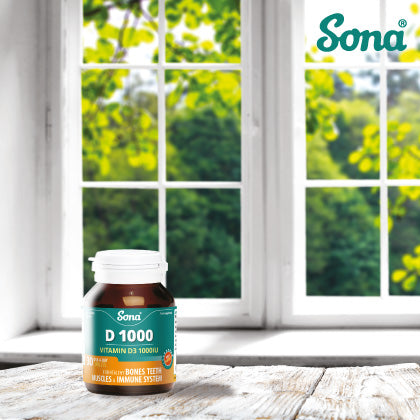
Vitamin D, also known as calciferol, is a fat-soluble vitamin (meaning that it is absorbed along with dietary fat and can be stored in the body’s fatty tissue) that is naturally present in few foods, such as the flesh of fatty fish, beef, liver, cheese, egg yolks, and mushrooms that have been grown under UV light.
Our primary source of vitamin D comes from the sun (we obtain about 80-90% of it this way). However, vitamin D is seasonal and cannot be made in the winter, while the amount made in the summer is subject to sunshine, weather, and other factors. In Ireland, vitamin D can be made from 10-15 minutes of sun exposure from late March to late September.
Vitamin D is extremely important for overall health, thus it is important that we are we receiving an adequate amount of vitamin D, whether from the sun, through diet, or through supplementation. Vitamin D has been linked to numerous health conditions, from bone and muscle health, to mental health, immune activity, cardiovascular functions, and more.
Below are 5 benefits of vitamin D.
- Bone and muscle health:Muscles and bones are continuously being restructured through mineralization (the process of deposition of minerals on the bone matrix). Vitamin D plays a fundamental role in this process by helping the body regulate the absorption of phosphorus and calcium within the body, two compounds that provide density and strength to muscles and bones.
-
Mental health:Vitamin D is involved in regulating neurotransmitter synthesis. Serotonin, the key hormone that stabilizes our mood, feelings of well-being, and happiness, rises when exposed to bright light and falls with decreased exposure. Research has shown that increasing levels of vitamin D overtime could effectively help to reduce the symptoms of anxiety, depression, as well as other mood disorders. Vitamin D has also shown beneficial in helping with premenstrual mood symptoms in women.
- Heart health:Various studies have indicated that those with high blood pressure experienced a drop in numbers when vitamin D levels were increased. Vitamin D3 actively reduces the concentration of renin, an enzyme secreted by the kidney that influences blood vessels. In turn, improving cardiovascular endurance and keeping heart muscle cells from growing too large.
- Immune function:Vitamin D has also been found to have a significant effect on the body’s immune system. Vitamin D boosts the pathogen-fighting abilities of monocytes and macrophages (white blood cells that play a key role in immune protection), and helps reduce inflammation, which aids immunological response.
- Insulin control:Vitamin D helps regulate blood sugar levels by activating the pancreas in which triggers the process of insulin production. Vitamin D has even shown effective in decreasing insulin sensitivity in pre-diabetic patients.
Sona D1000 provides 1000 IU of Vitamin D per tablet.
References
- EHRLICH, G. (2010). Sunshine and Vitamin D. A Comprehensive Guide to the Benefits of the “Sunshine Vitamin”. The Journal Of Rheumatology, 37(2), 475-475. doi: 10.3899/jrheum.091173.
- Kim, S., Lutsey, P., & Michos, E. (2017). Vitamin D and Cardiovascular Disease: Can Novel Measures of Vitamin D Status Improve Risk Prediction and Address the Vitamin D Racial Paradox?. Current Cardiovascular Risk Reports, 11(1). doi: 10.1007/s12170-017-0528-7.
- Martens, P., Gysemans, C., Verstuyf, A., & Mathieu, C. (2020). Vitamin D’s Effect on Immune Function. Nutrients, 12(5), 1248. doi: 10.3390/nu12051248.
- Penckofer, S., Kouba, J., Byrn, M., & Estwing Ferrans, C. (2010). Vitamin D and Depression: Where is all the Sunshine?. Issues In Mental Health Nursing, 31(6), 385-393. doi: 10.3109/01612840903437657.
- Relationship between serum Vitamin D and insulin resistance in pre-diabetic and diabetic states- A comparative study. (2020). International Journal Of Clinical Biochemistry And Research, 5(1), 91-96. doi: 10.18231/2394-6377.2018.0018.
- Tanner, S., & Harwell, S. (2015). More than healthy bones: a review of vitamin D in muscle health. Therapeutic Advances In Musculoskeletal Disease, 7(4), 152-159. doi: 10.1177/1759720x15588521.
- Vitamins and minerals - Vitamin D. (2021). Retrieved 14 July 2021, fromhttps://www.nhs.uk/conditions/vitamins-and-minerals/vitamin-d/.
